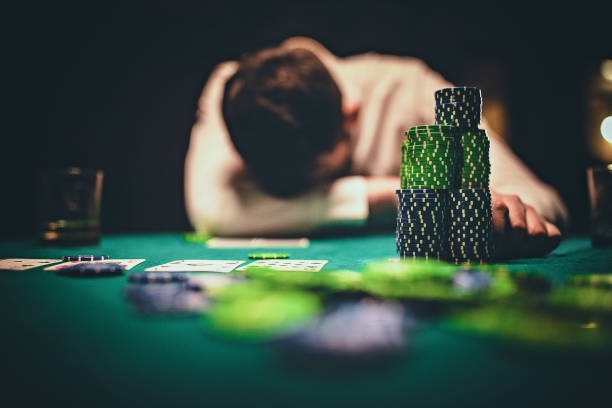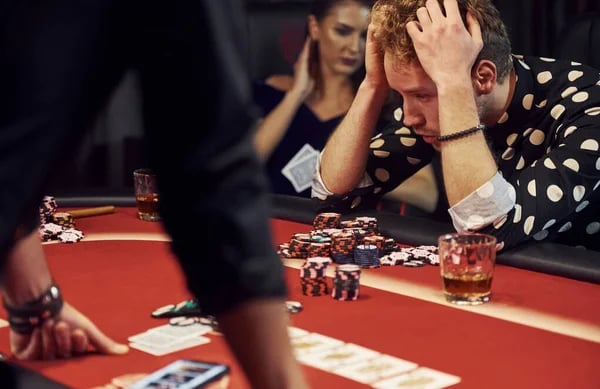Why Casinos Are Addictive: The Psychology, Stories & Science Behind Gambling
Discover why casinos are addictive through storytelling and science. Learn how lights, sounds, rewards, and human psychology keep players hooked and tips to gamble responsibly.
AWARENESS
9/3/20256 min read
Introduction: The Spark That Starts It All
The first time Rohan walked into a casino, he felt like he’d stepped into another world. The neon lights shimmered like stars, slot machines sang in chorus, and the air buzzed with energy. He wasn’t even a gambler—at least, not yet. But as he exchanged his cash for chips and sat at a blackjack table, he felt something electric run through his veins.
That first win, even if small, sent his heart racing. It wasn’t about the money. It was the thrill. The atmosphere wrapped him up like a warm blanket, making him forget the outside world. Hours later, when he finally walked out, it was morning, and he hadn’t realized how much time had passed.
For many, this is how it begins—a single night of excitement that turns into a habit. But why are casinos so addictive? Why do people like Rohan, who never thought of themselves as gamblers, find themselves drawn back again and again?
Let’s dive deep into the psychology, design, and science that make casinos irresistible, told through stories and real-life insights.
The Science of the “Casino High”
Casinos aren’t just places to play games. They’re carefully engineered environments designed to keep you hooked. The thrill you feel when you win—even a small amount—isn’t just in your imagination. It’s your brain releasing dopamine, the “feel-good” chemical responsible for pleasure and reward.
Every time you hear coins clinking, lights flashing, and people cheering, your brain gets a rush of dopamine. Over time, your brain begins to crave this feeling, and you associate it with the casino.
This is why you don’t need a big jackpot to feel excited. Even a small win can keep you playing for hours, because your brain treats it as a reward, reinforcing your behavior.
The Story of Rohan: How Luck Feels Like Magic
Rohan’s second visit to the casino was even more thrilling. He decided to try roulette this time, placing small bets. At first, he lost. Then he hit a streak—red, red, red. His winnings doubled, then tripled. He felt unstoppable.
“This is my night,” he thought.
But luck has a way of turning. Within an hour, he lost everything he’d won. And yet, he couldn’t stop playing. The excitement wasn’t just in winning anymore; it was in chasing the win.
Rohan’s story mirrors that of many casino-goers. The rush of an early win makes you believe you’re “lucky” or “due for another win,” creating a cycle of hope and risk.
Why Casinos Feel Like Another World
Casinos are designed to disconnect you from reality. Here’s how they do it:
No Clocks or Windows: Casinos intentionally avoid clocks and windows so you lose track of time. You could spend hours inside without realizing it.
Lighting and Sound: The flashing lights and upbeat sounds create excitement. Slot machines, in particular, are designed to play happy music even when you don’t win much, keeping you motivated.
Free Drinks and Perks: Casinos often give away drinks or snacks to make you feel welcome and relaxed, encouraging you to stay longer.
Labyrinth Layout: Ever notice how casinos feel like mazes? That’s intentional. The layout makes you wander past slot machines and tables, tempting you to play more games.
Casinos don’t just offer gambling; they create a complete sensory experience that keeps you engaged.
The Psychology of “Almost Winning”
One of the most powerful tricks casinos use is the near-miss effect.
For example, imagine playing a slot machine. You see two jackpot symbols line up, and the third stops just one space away. That near-miss makes your brain feel like you were “so close,” encouraging you to try again.
Psychologically, a near-miss activates the same brain regions as a win. You feel rewarded even though you didn’t actually win, which motivates you to keep playing.
This is why slot machines are often called the “crack cocaine of gambling”—they deliver quick, unpredictable rewards that hook your brain.
The Role of Intermittent Rewards
In casinos, rewards are unpredictable. This is called a variable ratio reward system, one of the most addictive reinforcement methods known in psychology.
Think of it this way:
If you knew exactly when you’d win, gambling would get boring.
But when wins are random, every spin or card flip feels exciting because “this might be the one.”
This is the same system that makes social media and video games addictive. Your brain loves uncertainty because it keeps you chasing the next dopamine hit.
The Social Factor: Feeling Like You Belong
Casinos are also social spaces. You’re surrounded by energy—people laughing, cheering, and winning. This environment creates a sense of community and excitement.
Even if you’re losing, seeing someone else win keeps your hope alive: “If they can win, maybe I can too.”
Many people who feel lonely or stressed are drawn to casinos for the social atmosphere as much as the games. It becomes a place where you feel alive and connected.
Why Early Wins Hook You for Life
Let’s go back to Rohan. After a few more visits, he noticed something strange:
He wasn’t winning as much anymore.
But he kept chasing the thrill of that first big win.
Psychologists call this the “gambler’s fallacy.” When you win early, your brain remembers the rush and convinces you that you can win again if you keep playing. Casinos rely on this to keep players coming back.
The Illusion of Control
Another reason casinos are addictive is that they make you feel like you have control, even when you don’t.
In roulette, choosing numbers feels like strategy, but the outcome is random.
In slot machines, pressing buttons gives the illusion that timing matters, but the results are determined by algorithms.
This illusion of control tricks players into believing their skill can change outcomes, motivating them to play longer.
The Rise of Online Casinos: Addiction in Your Pocket
In the past, you had to physically visit a casino. Today, online gambling brings the thrill to your smartphone. Online casinos use the same psychological tricks:
Bright graphics and sounds.
Free spins and welcome bonuses.
Instant deposits and withdrawals.
The convenience of playing anytime, anywhere, makes it easier to get hooked. For some, this accessibility has turned casual gambling into a dangerous habit.
Stories from Real Players
Let’s meet Priya, a working professional who started gambling online during lockdown. She thought it was harmless fun—a few spins on a slot game after work. But within a year, she was spending thousands, hiding her gambling from her family.
“It wasn’t even about winning anymore,” she admitted. “It was about the rush. I’d lose money, and I’d keep playing because I thought the next spin would save me.”
Priya eventually sought help, but her story is a reminder of how quickly casual gambling can spiral out of control.
How Casinos Keep You Coming Back
Casinos don’t just rely on games to keep players engaged. They use:
Loyalty Programs: Free hotel stays, meals, and rewards make you feel valued.
Music and Scent: Even scents in casinos are carefully chosen to create a relaxing atmosphere.
Marketing: Emails, texts, and ads remind you of special offers to lure you back.
The Fine Line Between Fun and Addiction
Gambling isn’t inherently evil. For many, it’s just entertainment. But for others, the line between fun and addiction blurs quickly.
Here are some warning signs of gambling addiction:
Spending more money than you planned.
Hiding gambling from friends or family.
Chasing losses.
Feeling restless or irritable when not gambling.
Gambling to escape stress or problems.
If you recognize these signs, it’s important to step back and seek help.
Tips to Gamble Responsibly
Set a Budget: Decide how much you’re willing to lose before you play.
Set a Time Limit: Avoid marathon sessions by setting alarms.
Avoid Chasing Losses: Accept that losing is part of the game.
Take Breaks: Step outside, clear your head, and regain perspective.
Self-Exclude If Needed: Many casinos and online platforms offer self-exclusion programs.
Conclusion: Understanding the Addiction is the First Step
Casinos are addictive because they’re designed to be. From flashing lights to unpredictable wins, every detail is crafted to keep you engaged. But knowledge is power. When you understand the psychology behind gambling, you’re better equipped to enjoy it responsibly.
For Rohan, the thrill of that first win no longer controls him. He still enjoys a night at the casino, but now he sees it for what it is: entertainment, not a money-making plan.
Gambling can be fun, exciting, and social—but only when you’re in control. If you ever feel the pull becoming too strong, step back, ask for support, and remember that no game is worth your peace of mind.




© 2025. All rights reserved.
Follow us
Quick Links


